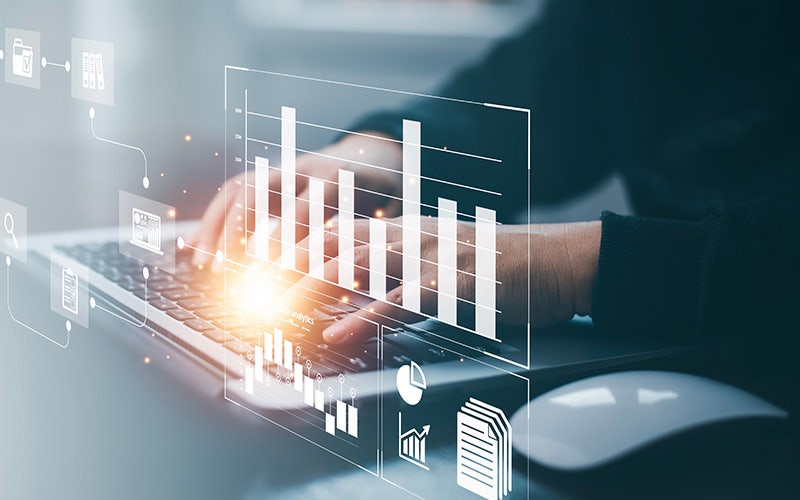The evolving role of technology in modern accounting and finance

In recent years, technology has played a pivotal role in transforming the accounting and finance sector. From automation and artificial intelligence (AI) to advanced data analytics and cloud computing, technological advancements have revolutionised the way accountants work, the processes they follow, and the decisions they make.
This blog will explore how these developments and digital transformation are reshaping the accounting profession, the strategies for integrating accounting technology effectively, and the impacts technology has on the role of the accountant.
How is artificial intelligence transforming the finance sector?
Artificial intelligence (AI) is fundamentally reshaping the finance sector, driving an era of unprecedented innovation and efficiency.
Here are some key ways in which AI is revolutionising finance:
-
Automating repetitive tasks: AI-powered systems can perform repetitive tasks, such as data entry and reconciliation, faster and more accurately than humans. This saves time and reduces the risk of human error.
-
Enhancing fraud detection: AI algorithms can analyse vast amounts of financial data in real-time, identifying patterns and anomalies that might indicate fraudulent activities. This helps financial institutions prevent and mitigate risks.
-
Improving customer service: AI-powered chatbots and virtual assistants are transforming customer interactions by providing personalised and instant responses to queries. This enhances customer satisfaction and reduces workload on human customer service agents.
-
Streamlining underwriting processes: AI algorithms can analyse borrower data and credit risk factors more effectively, leading to quicker and more accurate loan approvals.
-
Optimising portfolio management: AI can analyse market trends and historical data to create more informed investment strategies, reducing risk and improving returns.
What are the benefits of using big data in finance?
The term ‘big data’ refers to large data sets that are analysed by algorithms to unearth patterns and trends. It has become an invaluable asset in the financial sector, offering a wide range of benefits to financial institutions and their clients.
Here are some key advantages of using big data in finance:
-
Enhanced decision-making: Big data analytics can provide financial institutions with valuable insights into budgeting, customer behaviour, market trends, and risk factors. This enables more informed and data-driven decision-making, leading to better outcomes.
-
Improved risk management: Financial companies are able to identify and mitigate risks more effectively. By analysing vast amounts of data and forecasting future possibilities, they can spot potential risks early and take proactive measures to manage them.
-
Personalised client experience: The specific needs and preferences of individual customers can be identified through data analysis, allowing providers to tailor their products and services for higher customer satisfaction and loyalty.
-
Operational efficiencies: Big data analytics can help financial institutions to streamline their operations by identifying time-consuming inefficiencies and workflow bottlenecks, leading to cost savings and improved overall performance.
-
Regulatory compliance: Automating data collection, analysis, and financial reporting can reduce the risk of non-compliance and penalties, and can maintain comprehensive records and financial statements which make audits easier.
Effective strategies for integrating technology into accounting practices
To integrate new technology effectively, businesses need to develop a clear strategy which covers every stage - from consideration to roll-out.
At the beginning, specific needs must be identified. By having a clear idea of what they want the technology to achieve, stakeholders can all be on the same page when they start researching options and comparing packages. Appropriate technologies can then be selected, and the implementation of it should be put into a timeline to allow open communication with colleagues and employees on when it’ll come into effect.
A company will need to invest in training for the finance and accounting professionals who’ll be using the new technology, both before implementation and on an on-going basis for refreshers and new starters.
Regular evaluations and updates to new technology are also essential to ensure it continues to meet business requirements.
How can cost accounting systems help mitigate financial risk?
Cost accounting systems play a critical role in mitigating financial risk. They provide accurate financial information on costs associated with various activities, allowing for the identification of inefficiencies.
This enables accountants to make informed decisions to reduce costs and improve profitability. Additionally, cost accounting systems help identify and mitigate potential risks, ensuring the financial stability of the business.
The impacts of emerging technologies on an accountant’s role and skills
Emerging technologies like AI and machine learning have significantly impacted accountants’ roles and required skill sets.
While automation has reduced the need for manual data entry and bookkeeping, accountants now need to possess advanced data analytics skills. Proficiency in accounting software and cloud-based systems has also become essential, along with a deeper understanding of data interpretation and analysis.
Latest fintech trends affecting accounting practices
Fintech (financial technology) innovations are changing accounting practices. Accountants must adapt to these trends to keep their knowledge and skills up-to-date and to progress their careers.
Below, we outline some current fintech trends.
Blockchain technology
Blockchain is a decentralised, distributed ledger that records transactions across a network of computers. Each transaction is recorded in a “block”, which is linked to the previous block, forming a chain. This creates a tamper-proof record of transactions, making it difficult to alter or falsify data, providing transparency and security.
This technology has the potential to streamline accounting processes. By automating record-keeping and reducing the need for manual reconciliation, blockchain technology can save time and reduce the risk for errors.
Digital currencies
Digital currencies, or cryptocurrencies, are another fintech trend that is affecting accounting practices. They are digital assets that use cryptography for security and are often decentralised, meaning they are not controlled by any central authority.
One of the key advantages is their ability to facilitate fast and low-cost cross-border transactions. This can be particularly valuable for businesses that operate internationally as it can reduce the need for traditional banking services and associated fees. They can, however, be volatile and subject to rapid price fluctuations. The tax treatment of digital currencies also varies by jurisdiction, adding another layer of complexity for accountants.
Peer-to-peer lending
Peer-to-peer (P2P) lending is a form of lending that connects individual borrowers with individual lenders through an online platform.
For accountants, P2P lending presents both opportunities and challenges. On the one hand, P2P lending can provide access to alternative sources of financing for clients. On the other hand, P2P lending platforms may present risks, such as credit risk and regulatory compliance risk, that accountants need to manage.
Crowdfunding
Crowdfunding is a method of raising capital from a large number of individuals through an online platform. Crowdfunding platforms allow entrepreneurs and businesses to pitch their ideas or projects to potential investors, who can then contribute funds in exchange for a stake in the venture or a reward.
Similarly to P2P lending, crowdfunding presents both opportunities to funding and challenges to fraud and risk which accountants must be aware of.
Become well-equipped for the future of accounting
Technology has become a crucial component of modern accounting and finance. Its impact spans across various aspects, from data processing and analysis to decision-making and risk management. To thrive in the digital era, accountants must adapt to new technologies, develop advanced skill sets, and embrace the opportunities they bring. By doing so, they can enhance efficiency, accuracy, and strategic-decision making.
Bring your knowledge up-to-date and become sought-after in modern finance workplaces and accounting firms with St Mary’s University’s 100% online MBA with Accounting. Taught part-time, you’ll become well equipped to progress your career in the exciting and evolving accounting industry.














The information below is required for social login
Login to your Account
JOIN FOR FREE
Let’s begin with setting up your account to keep track of your progress